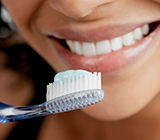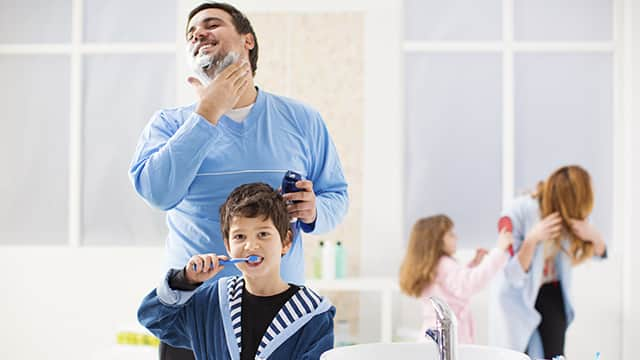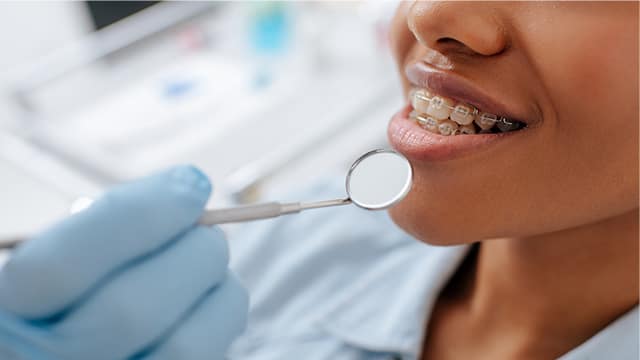What Type of Toothbrush Should I Use?
With so many shapes, sizes and styles of toothbrushes on the market, deciding how to choose the right toothbrush can be confusing. Here's what you should look for:
Most UK dental professionals agree that a medium-bristled brush is best for removing plaque and debris from your teeth. Small-headed brushes are also preferable, since they are better at reaching all areas of the mouth, including hard-to-reach back teeth. If you have sensitive teeth, choose a soft-bristled brush or look for sensitive brush heads.
When it comes to the type of handle (such as non-slip grip or flexible neck), shape of the head (tapered or rectangular), and style of toothbrush bristles (such as rippled, flat or trimmed to a dome shape), pick whatever is most comfortable for you. A good toothbrush is one that fits your mouth and allows you to reach all teeth easily. If in doubt, check with your dentist or hygienist.
For many, an electric toothbrush is a good alternative. It can do a better job of cleaning teeth, particularly for those who have difficulty brushing or who have limited manual dexterity.
Electric Toothbrush Vs. Manual
These days, many people choose an electric toothbrush over a manual, and there are lots of reasons for that! Manual toothbrushes still do the job, they’re affordable and don’t need to be charged. However, it can be easy to brush too hard with a manual brush, which can hurt your teeth and gums. Here are some benefits of using an electric toothbrush:
An electric toothbrush is the best toothbrush for plaque removal and they’ve been proven to decrease plaque and gingivitis symptoms more effectively than a manual brush.
They’re easier for people with limited mobility due to the oscillating brush head.
They have built-in timers so you know if you’ve brushed for long enough.
They often have pressure sensors that will light up if you’re brushing too hard.
They can be less wasteful as you only have to dispose of the brush head instead of a whole toothbrush.
They’re better for people with braces as they make brushing easier and can get into harder to reach spaces.
How Often Should I Replace My Toothbrush?
Whether you choose a manual or an electric toothbrush, you should replace your toothbrush when the bristles begin to show wear, or every three months, whichever comes first.
 |
| A worn toothbrush (top) can damage gum tissue. Replace your toothbrush every three months or when it becomes worn. |
How to Brush Teeth
When it comes to your oral health, brushing your teeth well is just as important as when you brush. Whether you use a manual or an electric toothbrush, choose one with soft bristles as a hard toothbrush can be too abrasive on your tooth enamel. Here are some steps to follow to make sure you’re brushing your teeth properly:
Wet your toothbrush head under the tap then add a pea-sized amount of fluoride toothpaste.
Hold your toothbrush at a 45° angle and make sure you brush all the surfaces of your teeth – including the outer, inner and chewing surfaces.
Brush for 2 minutes using short, circular motions.
Don’t forget about your tongue! Once your teeth are clean, brush your tongue with your toothbrush.
Spit out any excess toothpaste – don’t swallow.
Use a tongue scraper, dental floss or interdental brushes to clean between your teeth and remove any leftover bacteria and food particles.
Finish by swishing your mouth with an alcohol-free mouthwash that contains fluoride – for example, Colgate Total Advanced Plaque Protect Mouthwash.
FAQ
What are good dentist recommended toothbrushes?
Electric toothbrushes are often recommended to improve oral hygiene. Using an electric toothbrush is an easy way to get a great clean and leave your mouth feeling fresh and healthy.
No matter which toothbrush you choose, the most important things are:
Brush your teeth twice a day – in the morning and in the evening.
Brush for at least 2 minutes.
Choose a soft-bristled toothbrush over a hard toothbrush.
Don’t rinse your mouth with water after brushing or you’ll wash away the protective fluoride in your toothpaste.
What is the best toothbrush to remove plaque?
Electric toothbrushes have been proven to remove plaque better than manual brushes. This study by Cochrane shows that after three months of using an electric toothbrush, plaque was reduced by 21% and gingivitis symptoms by 11%.
What toothbrush should I use for my kids?
Good oral hygiene starts at an early age and you can choose either a manual or an electric toothbrush for your kids. Brushing with an electric toothbrush is easier for children, however, sometimes they don’t like the noise and vibrations. No matter which toothbrush you choose, make sure the head is small enough for little mouths and has soft toothbrush bristles. It’s advised that children can use an electric toothbrush from around 3 years old.
What is the best toothbrush for braces?
Electric toothbrushes are more effective for people with braces as the oscillating toothbrush head is better at reaching smaller and tight spaces than a manual brush head. Be sure to follow up your brushing by cleaning between your teeth with interdental brushes.
Hopefully this article has helped to answer some of your most common questions about how to choose the right toothbrush. Great oral care starts at home; if you look after your teeth and visit your dentist regularly, you’ll be smiling for years to come!
This article is intended to promote understanding of and knowledge about general oral health topics. It is not intended to be a substitute for professional advice, diagnosis or treatment. Always seek the advice of your dentist or other qualified healthcare provider with any questions you may have regarding a medical condition or treatment.
ORAL HEALTH QUIZ
What's behind your smile?
Take our Oral Health assessment to get the most from your oral care routine
ORAL HEALTH QUIZ
What's behind your smile?
Take our Oral Health assessment to get the most from your oral care routine













